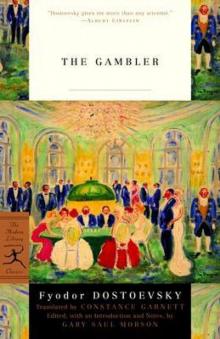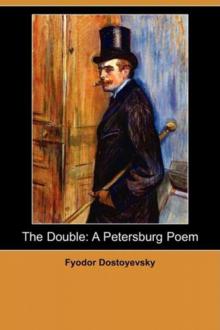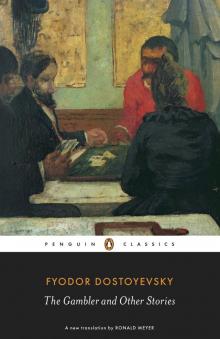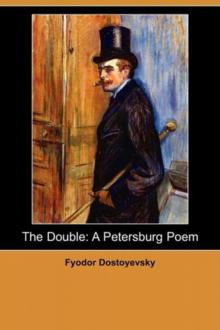- Home
- Fyodor Dostoyevsky
Notes from the Underground Page 3
Notes from the Underground Read online
Page 3
III
With people who know how to revenge themselves and to stand up forthemselves in general, how is it done? Why, when they are possessed,let us suppose, by the feeling of revenge, then for the time there isnothing else but that feeling left in their whole being. Such agentleman simply dashes straight for his object like an infuriated bullwith its horns down, and nothing but a wall will stop him. (By theway: facing the wall, such gentlemen--that is, the "direct" persons andmen of action--are genuinely nonplussed. For them a wall is not anevasion, as for us people who think and consequently do nothing; it isnot an excuse for turning aside, an excuse for which we are always veryglad, though we scarcely believe in it ourselves, as a rule. No, theyare nonplussed in all sincerity. The wall has for them somethingtranquillising, morally soothing, final--maybe even somethingmysterious ... but of the wall later.)
Well, such a direct person I regard as the real normal man, as histender mother nature wished to see him when she graciously brought himinto being on the earth. I envy such a man till I am green in theface. He is stupid. I am not disputing that, but perhaps the normalman should be stupid, how do you know? Perhaps it is very beautiful,in fact. And I am the more persuaded of that suspicion, if one cancall it so, by the fact that if you take, for instance, the antithesisof the normal man, that is, the man of acute consciousness, who hascome, of course, not out of the lap of nature but out of a retort (thisis almost mysticism, gentlemen, but I suspect this, too), thisretort-made man is sometimes so nonplussed in the presence of hisantithesis that with all his exaggerated consciousness he genuinelythinks of himself as a mouse and not a man. It may be an acutelyconscious mouse, yet it is a mouse, while the other is a man, andtherefore, et caetera, et caetera. And the worst of it is, he himself,his very own self, looks on himself as a mouse; no one asks him to doso; and that is an important point. Now let us look at this mouse inaction. Let us suppose, for instance, that it feels insulted, too (andit almost always does feel insulted), and wants to revenge itself, too.There may even be a greater accumulation of spite in it than in L'HOMMEDE LA NATURE ET DE LA VERITE. The base and nasty desire to vent thatspite on its assailant rankles perhaps even more nastily in it than inL'HOMME DE LA NATURE ET DE LA VERITE. For through his innate stupiditythe latter looks upon his revenge as justice pure and simple; while inconsequence of his acute consciousness the mouse does not believe inthe justice of it. To come at last to the deed itself, to the very actof revenge. Apart from the one fundamental nastiness the lucklessmouse succeeds in creating around it so many other nastinesses in theform of doubts and questions, adds to the one question so manyunsettled questions that there inevitably works up around it a sort offatal brew, a stinking mess, made up of its doubts, emotions, and ofthe contempt spat upon it by the direct men of action who standsolemnly about it as judges and arbitrators, laughing at it till theirhealthy sides ache. Of course the only thing left for it is to dismissall that with a wave of its paw, and, with a smile of assumed contemptin which it does not even itself believe, creep ignominiously into itsmouse-hole. There in its nasty, stinking, underground home ourinsulted, crushed and ridiculed mouse promptly becomes absorbed incold, malignant and, above all, everlasting spite. For forty yearstogether it will remember its injury down to the smallest, mostignominious details, and every time will add, of itself, details stillmore ignominious, spitefully teasing and tormenting itself with its ownimagination. It will itself be ashamed of its imaginings, but yet itwill recall it all, it will go over and over every detail, it willinvent unheard of things against itself, pretending that those thingsmight happen, and will forgive nothing. Maybe it will begin to revengeitself, too, but, as it were, piecemeal, in trivial ways, from behindthe stove, incognito, without believing either in its own right tovengeance, or in the success of its revenge, knowing that from all itsefforts at revenge it will suffer a hundred times more than he on whomit revenges itself, while he, I daresay, will not even scratch himself.On its deathbed it will recall it all over again, with interestaccumulated over all the years and ...
But it is just in that cold, abominable half despair, half belief, inthat conscious burying oneself alive for grief in the underworld forforty years, in that acutely recognised and yet partly doubtfulhopelessness of one's position, in that hell of unsatisfied desiresturned inward, in that fever of oscillations, of resolutions determinedfor ever and repented of again a minute later--that the savour of thatstrange enjoyment of which I have spoken lies. It is so subtle, sodifficult of analysis, that persons who are a little limited, or evensimply persons of strong nerves, will not understand a single atom ofit. "Possibly," you will add on your own account with a grin, "peoplewill not understand it either who have never received a slap in theface," and in that way you will politely hint to me that I, too,perhaps, have had the experience of a slap in the face in my life, andso I speak as one who knows. I bet that you are thinking that. Butset your minds at rest, gentlemen, I have not received a slap in theface, though it is absolutely a matter of indifference to me what youmay think about it. Possibly, I even regret, myself, that I have givenso few slaps in the face during my life. But enough ... not anotherword on that subject of such extreme interest to you.
I will continue calmly concerning persons with strong nerves who do notunderstand a certain refinement of enjoyment. Though in certaincircumstances these gentlemen bellow their loudest like bulls, thoughthis, let us suppose, does them the greatest credit, yet, as I havesaid already, confronted with the impossible they subside at once. Theimpossible means the stone wall! What stone wall? Why, of course, thelaws of nature, the deductions of natural science, mathematics. Assoon as they prove to you, for instance, that you are descended from amonkey, then it is no use scowling, accept it for a fact. When theyprove to you that in reality one drop of your own fat must be dearer toyou than a hundred thousand of your fellow-creatures, and that thisconclusion is the final solution of all so-called virtues and dutiesand all such prejudices and fancies, then you have just to accept it,there is no help for it, for twice two is a law of mathematics. Justtry refuting it.
"Upon my word, they will shout at you, it is no use protesting: it is acase of twice two makes four! Nature does not ask your permission, shehas nothing to do with your wishes, and whether you like her laws ordislike them, you are bound to accept her as she is, and consequentlyall her conclusions. A wall, you see, is a wall ... and so on, and soon."
Merciful Heavens! but what do I care for the laws of nature andarithmetic, when, for some reason I dislike those laws and the factthat twice two makes four? Of course I cannot break through the wallby battering my head against it if I really have not the strength toknock it down, but I am not going to be reconciled to it simply becauseit is a stone wall and I have not the strength.
As though such a stone wall really were a consolation, and really didcontain some word of conciliation, simply because it is as true astwice two makes four. Oh, absurdity of absurdities! How much betterit is to understand it all, to recognise it all, all theimpossibilities and the stone wall; not to be reconciled to one ofthose impossibilities and stone walls if it disgusts you to bereconciled to it; by the way of the most inevitable, logicalcombinations to reach the most revolting conclusions on the everlastingtheme, that even for the stone wall you are yourself somehow to blame,though again it is as clear as day you are not to blame in the least,and therefore grinding your teeth in silent impotence to sink intoluxurious inertia, brooding on the fact that there is no one even foryou to feel vindictive against, that you have not, and perhaps neverwill have, an object for your spite, that it is a sleight of hand, abit of juggling, a card-sharper's trick, that it is simply a mess, noknowing what and no knowing who, but in spite of all theseuncertainties and jugglings, still there is an ache in you, and themore you do not know, the worse the ache.

 The Eternal Husband
The Eternal Husband Crime and Punishment
Crime and Punishment The Brothers Karamazov
The Brothers Karamazov Notes From Underground
Notes From Underground The Idiot
The Idiot Netochka Nezvanova (Penguin ed.)
Netochka Nezvanova (Penguin ed.) The Gambler
The Gambler The Double
The Double Poor Folk Anthology
Poor Folk Anthology The Gambler and Other Stories (Penguin ed.)
The Gambler and Other Stories (Penguin ed.) Prestuplenie i nakazanie. English
Prestuplenie i nakazanie. English Notes from the Underground
Notes from the Underground The Double: A Petersburg Poem
The Double: A Petersburg Poem White Nights and Other Stories / The Novels of Fyodor Dostoevsky, Volume X
White Nights and Other Stories / The Novels of Fyodor Dostoevsky, Volume X Complete Works of Fyodor Dostoyevsky
Complete Works of Fyodor Dostoyevsky Poor Folk and Other Stories
Poor Folk and Other Stories The House of the Dead
The House of the Dead